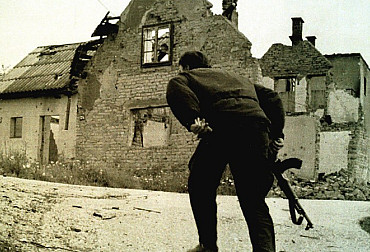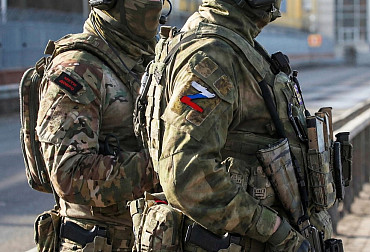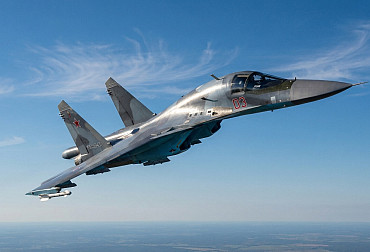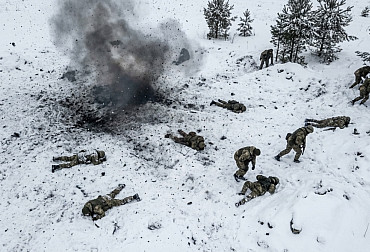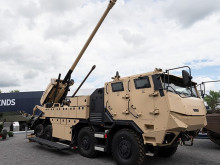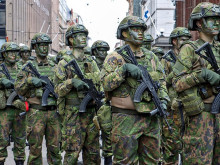Service dogs of the Military Police: perfect cooperation between man and animal
Recently, our editorial team had the opportunity to attend a demonstration of the training of service dogs of the Military Police and although I have seen the cooperation of a handler with a service dog in the past, the interplay between the cynologists of the Military Police (MP) and their four-legged partners really surprised me. It is not for nothing that the Military Police is one of the top service canines.
Video: Report from our visit to the cynological service of the Military Police / CZ DEFENCE
All three Military Police headquarters (the Military Police Protective Service Headquarters in Prague, the Military Police Headquarters in Tábor and the Military Police Headquarters in Olomouc) have service dogs or canine service. Each headquarters has a special canine unit where handlers train their dogs to search for explosives, drugs and weapons. The headquarters in Tábor and Olomouc include object protection units, which focus on the protection of objects designated by the Ministry of Defence.
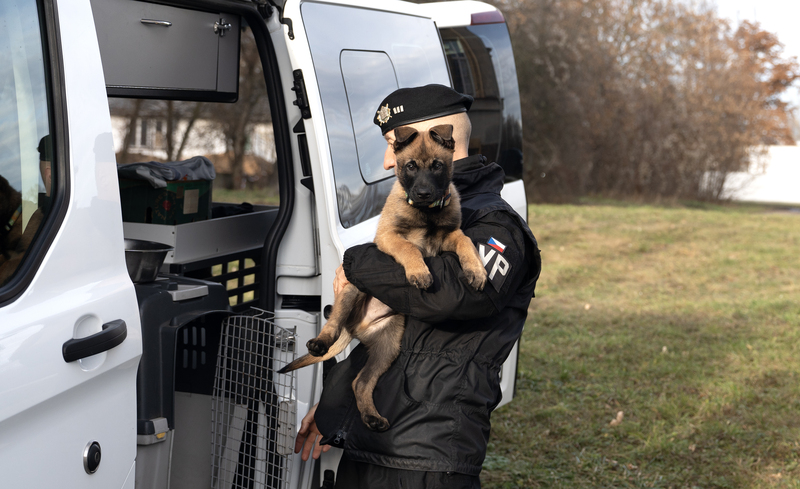
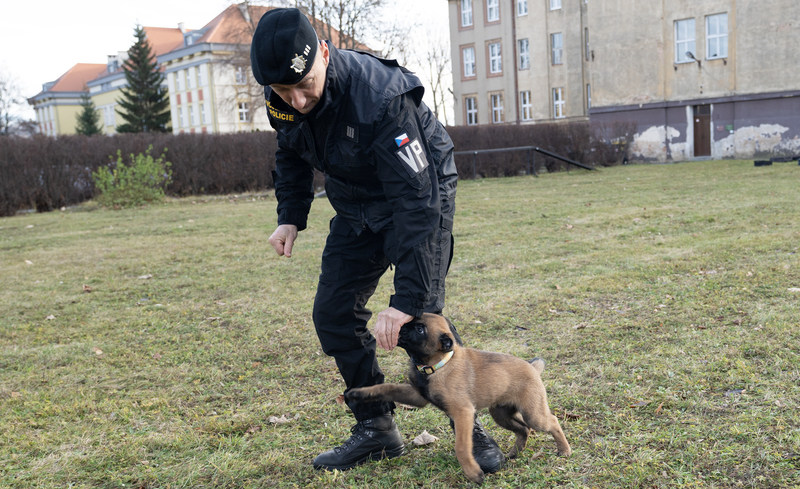
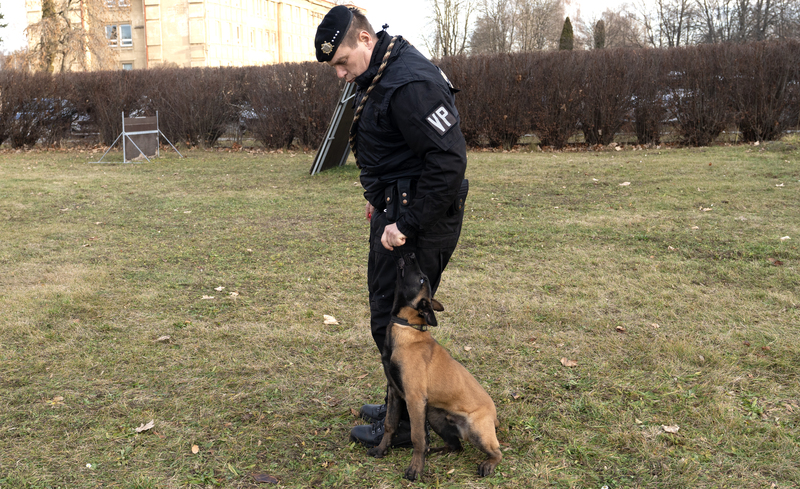
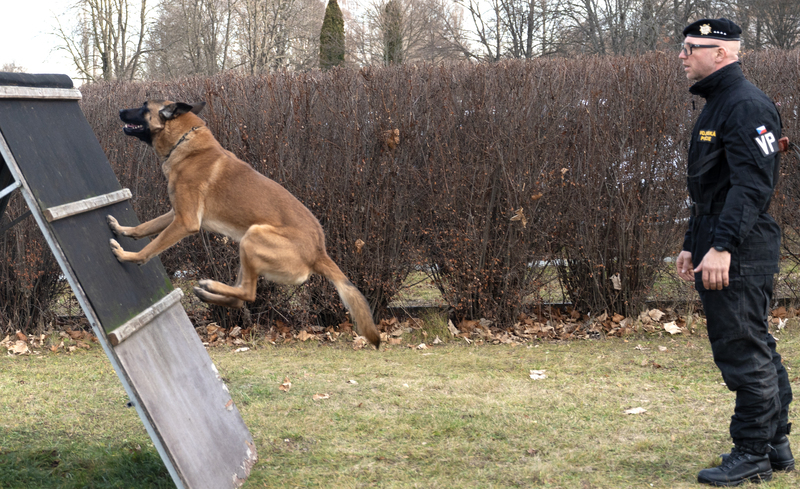
Based on the above, service dogs are divided into special dogs (search for explosives, drugs and weapons) and patrol dogs (protection of objects, security of order, etc.). Within the special dogs, they are further subdivided into dogs for weapons searches only, explosives searches only and drug searches only, for the reason that the handler should know more precisely what the dog has found. As far as dog breeds are concerned, the most common service dogs tend to be German or Belgian Shepherds, but for specialty dogs it can be quite surprising breeds such as the Flat Coated Retriever or Border Collie.
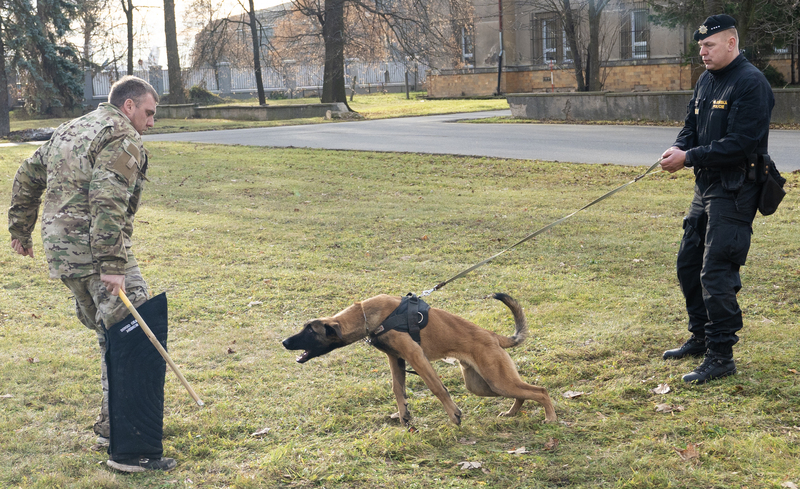
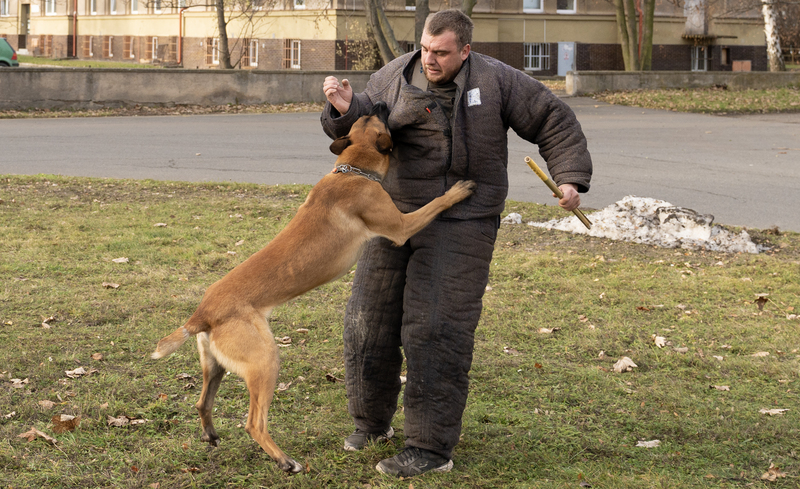
Each headquarters primarily secures its territory in the place where it is located. The canine service then trains individually within their respective headquarters, but there are also joint exercises where dogs of all categories come together and once a year a large exercise is held in Náměšt' nad Oslavou (this year the Czech military police have already held 12. It is also attended by other members of the security forces with their service dogs (the Czech Armed Forces, the Police of the Czech Republic, the Customs Administration of the Czech Republic, the Prison Service of the Czech Republic, the Municipal Police) and foreign guests (e.g. members of the Military Police from Slovakia, Poland or Belgium).
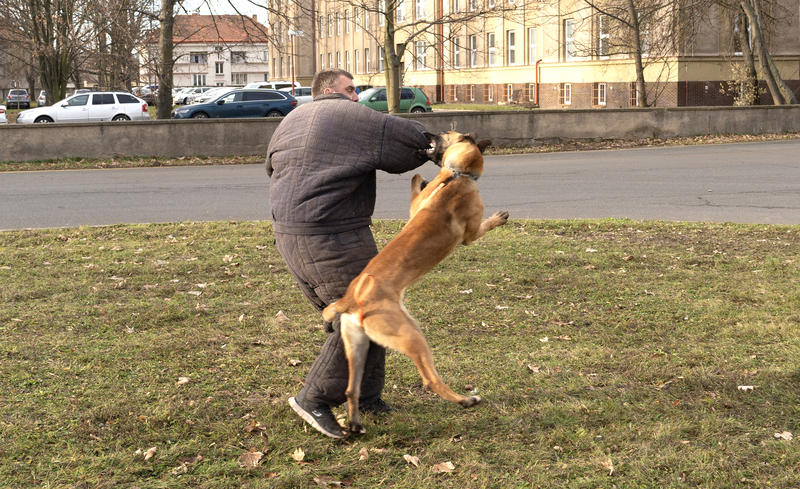
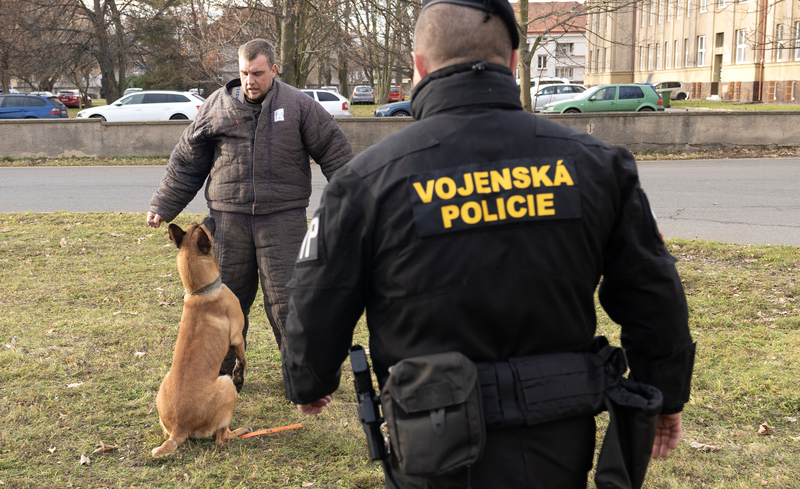
The chief cynologist of the Military Police, Maj. František Hanslík, who was with us throughout our visit, highlighted the opportunity to compare the training methodology and the experience of deploying service dogs during the international exercises. Major Hanslik also emphasized that the individual cynological services of NATO member states are trying to unify certain procedures in order to better cooperate with each other in the framework of joint deployment, for example, on a foreign operation.
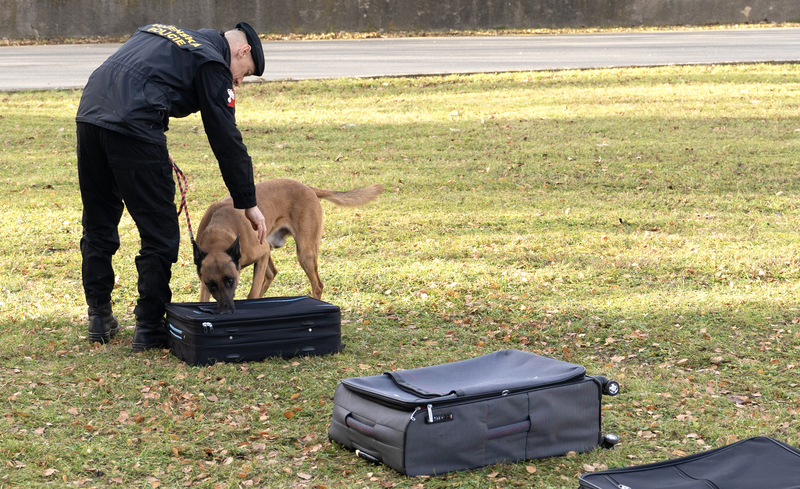
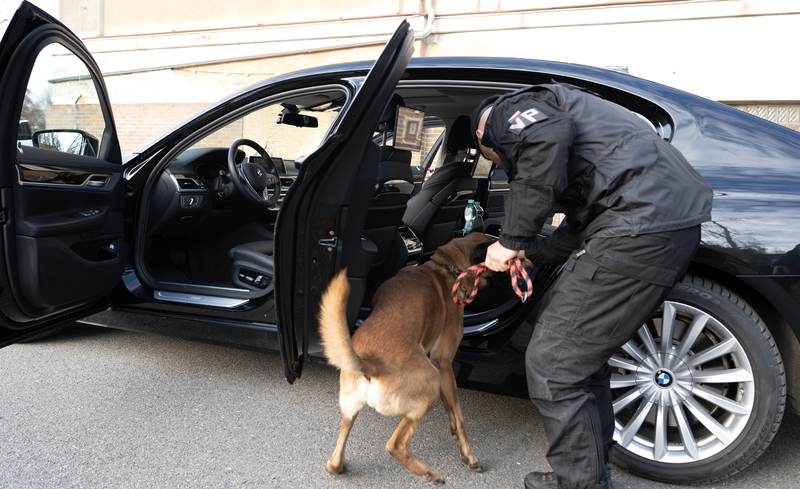
During our visit, we were shown various examples of cooperation of special and guard dogs with their handlers, from a small puppy, through an older puppy, to adult dogs. It was evident in all the dogs how much they enjoy their work and although they commanded due respect, it was evident in all the animals that they were not primarily aggressive in nature and were totally focused on their handler, whose commands the dogs followed immediately and flawlessly.
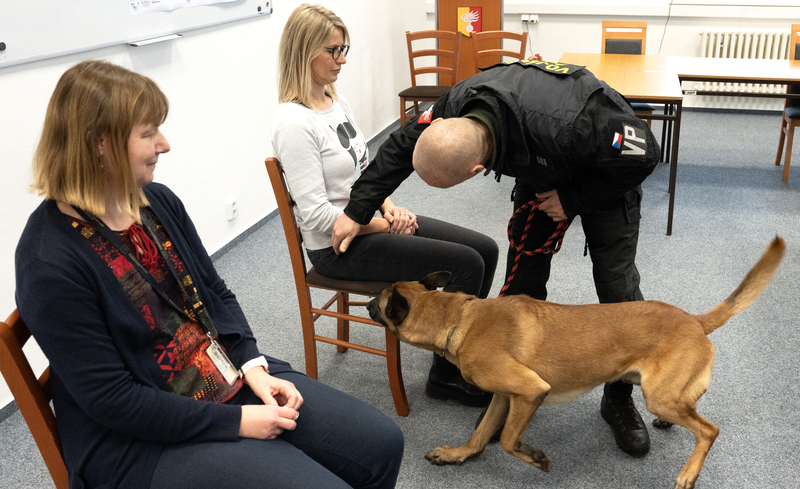
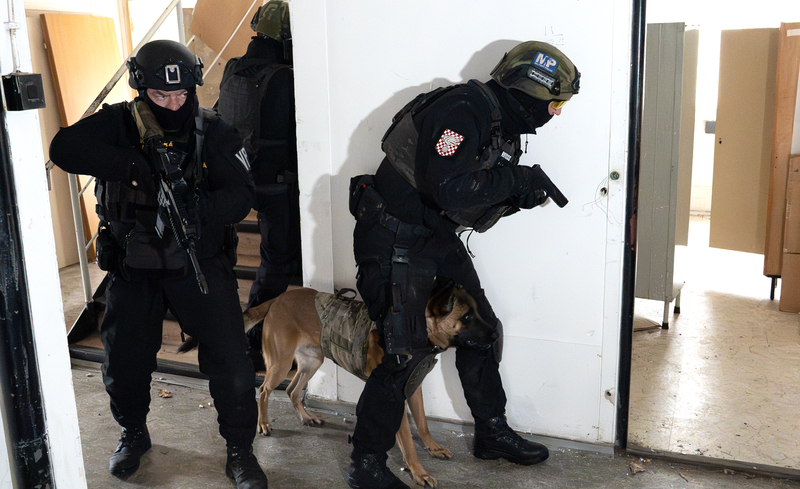
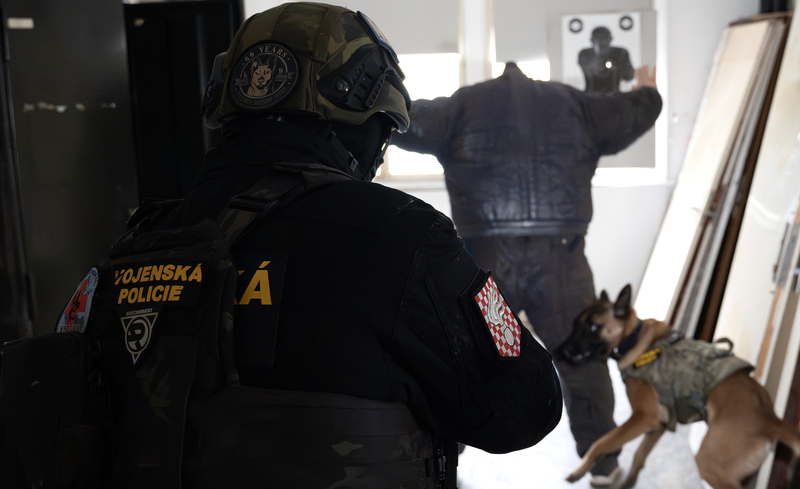
In addition to overcoming various obstacles, obedience training and searching for drugs or explosives, I was personally surprised by the ability of the service dog to transport a suspicious person to a place designated by the handler. This intervention took place by forcing the dog's head between the subject's crotch on the command "transport" and then pushing the "suspect" to the destination specified by the handler. Any unwanted manoeuvre of the "suspect" was then properly directed by the dog, and what can we say, with a growling dog's head in your crotch you will quickly get over any shenanigans. It was also interesting to see the securing of the aggressive "suspect" inside the building with the help of a service dog.
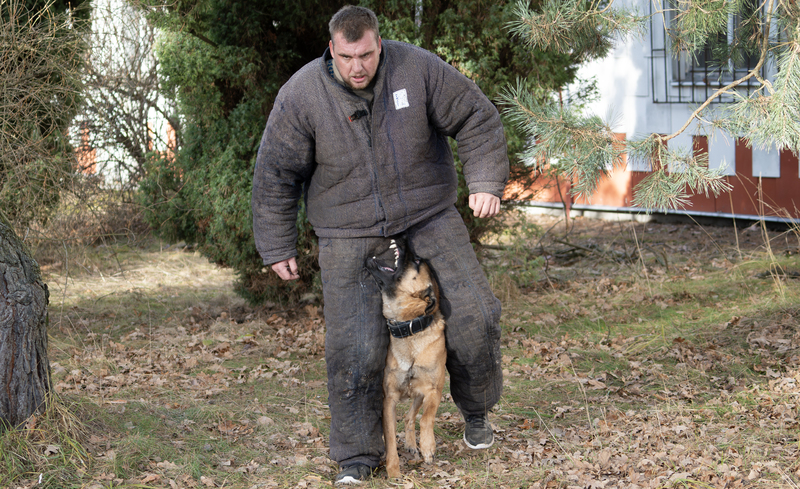
On the basis of everything we saw, we had various questions that we continuously asked to the aforementioned Chief Cynologist of the Military Police, Maj. František Hanslík.
Where do you specifically get puppies for future training and service in the MP (do you have any favourite kennels)?
The Military Police does not directly purchase puppies, but buys dogs aged 12 - 36 months. However, it supports a process where the handler finds, selects and acquires a puppy of his own liking and can thus participate in its socialization, education and training from an early age. This puppy is then prepared for service in the Military Police and sold to the Ministry of Defence at the age of 12 - 36 months. However, it must meet all the criteria for purchase like any other dog purchased. It also sometimes happens that a dog prepared from a puppy by a handler does not meet the purchase criteria and the Military Police will not buy it from that handler. Most of the time this is a failure to meet very strict health criteria.
As far as the selection of kennels is concerned, the Military Police does not prefer any kennel and also buys dogs without pedigree. In the case of puppy preparation by the handler it is purely his choice, experience or preference.
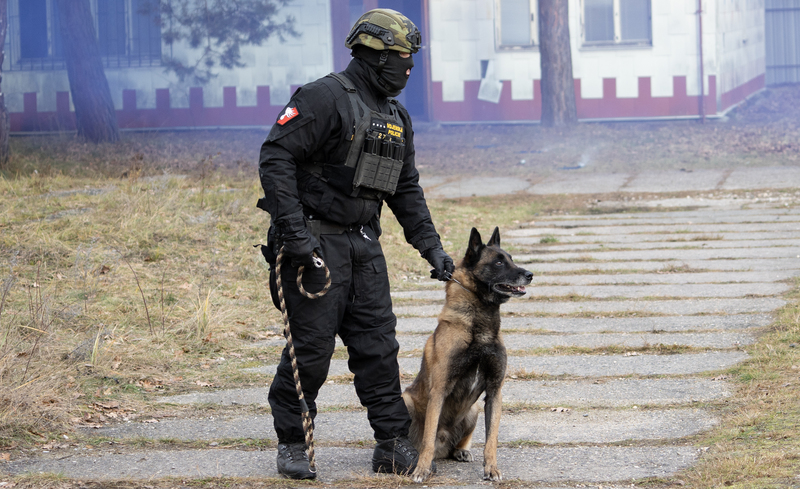
Future service dogs must first pass a character test. At what age is this test carried out? If a dog fails this test the first time, can it be repeated later or is it definitely excluded from potential service? Could it happen that you lose potential quality service dogs in this way just because they were too young and their temperament was still developing?
As part of the acquisition process, prospective service dogs undergo, in addition to a veterinary examination, an examination of their character traits and training abilities, as already mentioned, between the ages of 12 and 36 months. At this age, the dog's character traits can already be assessed, for example, in terms of reaction to the environment, various surfaces and distractions. At the same time, the 'prey instinct' needed for further training should be sufficiently developed, especially in future explosives, drugs or weapons search specialists. Future patrol dogs, which will participate in the performance of police protection tasks of MoD objects, must already be able to handle the detention of a person at a distance of about 100 steps or detention with the so-called counterattack, when there is a great psychological pressure on the evaluated dog.
If the dog fails this character test, it can repeat it, but in another selection procedure. The reason for this failure to meet the character criteria is usually a display of timidity or, on the contrary, unwanted aggression or failure to train certain exercises to the required level. It is, of course, up to the discretion of each dog owner whether it is realistic to eliminate the undesirable behaviour by proper training or to complete the required exercises. When acquiring dogs for the Military Police, we do not usually encounter repetition of character trait evaluations.
I do not think that the Military Police would lose quality dogs in this way. However, in some cases, especially with special dogs, I would personally focus the actual testing on the evaluation of character traits and not require already completed exercises or searches. This would prevent young dogs from being rushed unnecessarily and leading to minor training inaccuracies or mistakes that the handler then has to make difficult to correct during further training.
How many types of service dogs serve in the MP and can dogs be moved around during their service or do they end their careers where they started?
Military Police service dogs can be divided into two basic categories. The first category is patrol dogs, whose task is to participate in the protection of designated military objects, military material, public order in military objects or areas where the armed forces perform their tasks, etc. The second category is special dogs for searching for explosives, drugs or weapons. These are involved in the detection of crimes, preventive actions to search for explosives, drugs and weapons, protection and escort of the Minister of Defence or official foreign delegations, etc.
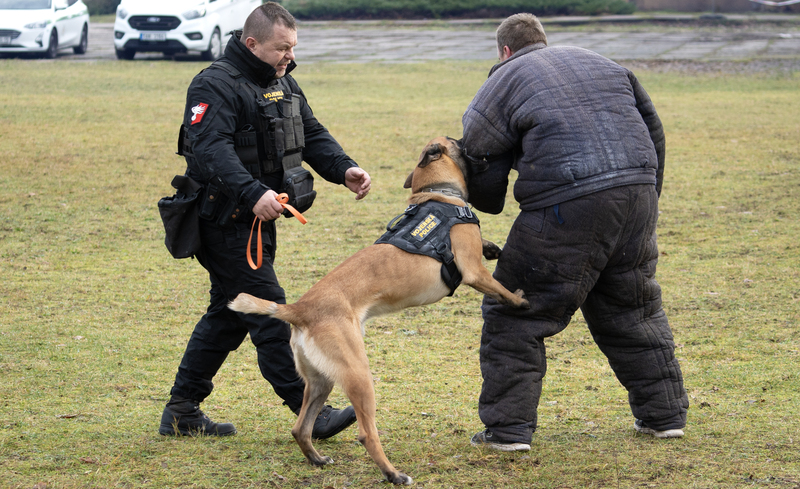
It is theoretically possible to change the category of the dog during the service. It may happen that during the training, the dog will show abilities that decide to use it in a different category than the one for which it was purchased. I remember this situation once during my service in the Military Police. As far as the change of handler is concerned, this situation sometimes occurs because of personnel changes in the ranks of handlers or, for example, going on parental leave. However, with any change of handler, the category is terminated and the new handler and dog pair must pass an exam to re-enter it. There are a minimal number of these changes in the Military Police, so the rule is that in almost all cases the dog will serve its entire career with one handler.
Are there any capabilities of service dogs that are not already being used by MP handlers?
The question is whether we are aware of all the abilities of the dogs and further, whether we are able to use the abilities in the right way. The training of service dogs is flexibly adapted to the times and the needs of the moment. This is demonstrated by the new disciplines that the dogs are able to perform. It is up to us to try to understand the dogs better and thus gain the opportunity to make full use of the sometimes incredible abilities that dogs have. As far as fulfilling the tasks of the Military Police is concerned, the scope and range of abilities of our service dogs is sufficient for us at the moment.
Does the technological shift in the Czech Armed Forces also affect the cynology of the Military Police in any way?
Definitely yes. Thanks to modern technology, it is possible to combine the use of technical means and service dogs and thus increase the effectiveness of, for example, the protection of objects of interest or persons. Every device, as well as every living creature, has its possibilities and limits. So you just need to find the right combination of modern technology and service dogs to achieve the best possible results.
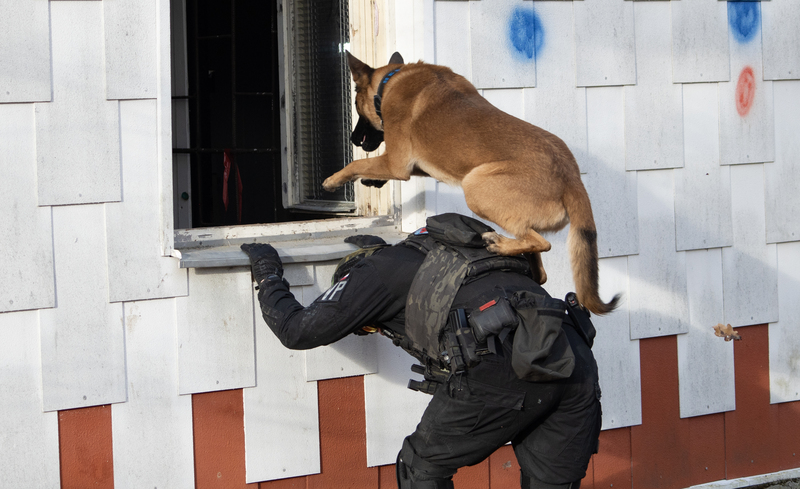
Is the Military Cynology Centre in Chotyně the only one used for training dogs or are dogs trained elsewhere?
The Military Police uses the Centre of Military Cynology mainly to certify dog categories, to complete courses for new handlers and to conduct dog purchases.
As far as its own canine training is concerned, the Military Police is independent and self-sufficient. The Military Police has its own instructors from the ranks of handlers, who are the most experienced officers with many years of experience and often with courses completed in other armed forces of the Czech Republic. Under the guidance of these instructors, the preparation of new dogs for category assignment, routine training, preparation for defences or canine competitions takes place. The training of handlers and service dogs of the Military Police is adapted to the tasks to be performed and therefore takes place in real conditions and premises and very often in cooperation with handlers of the Police of the Czech Republic, the Customs Administration of the Czech Republic, the Prison Service of the Czech Republic, etc.
Do only dogs trained by the officers themselves in the Czech Republic serve in the MP or are service dogs trained abroad also used?
In the Military Police, we support as much as possible the own initiative of the handlers who purchase a puppy, prepare it for the evaluation of its character traits and then sell it to the Military Police. Unfortunately, it is not legally possible for a Military Police handler to serve with his own dog. This work of the handlers is a guarantee that every handler wants to have the best prepared dog and does not try to sell a dog at any cost, which would then have problems in the future when performing tasks. Unfortunately, this sometimes happens with other dealers who offer dogs to the Military Police because to them it is simply business. All Military Police dogs come from the Czech Republic.
How old does a service dog retire on average (unless of course he gets injured, etc.)?
The retirement of a service dog is always an individual matter. During their active service, each dog undergoes a regular examination, the so-called category defence, where their ability to perform the required tasks is tested, and they also undergo regular veterinary examinations. In the event that a dog fails to pass the examination and the apparent cause is its physical condition due to, for example, advanced age, or the veterinary examination reveals various health problems that exclude the dog from active service, such a dog is usually excluded from further service with the Military Police. As a rule, it is usually at the age of about 8 - 10 years.
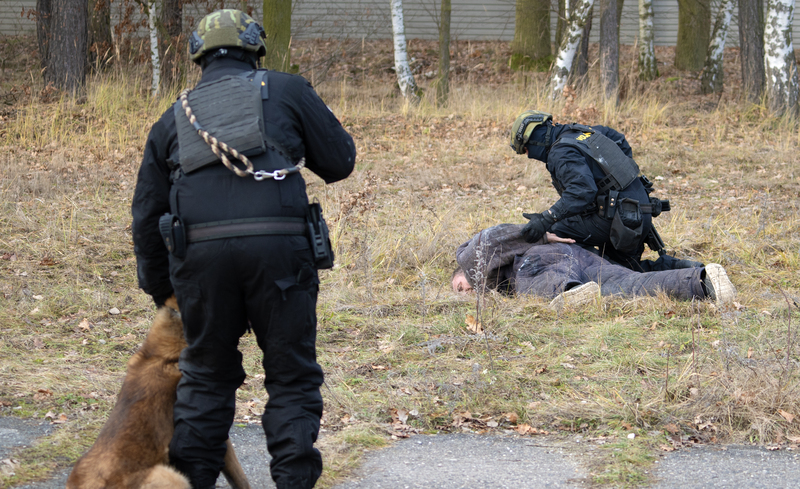
Are service dogs more dominated by females or males? Is there any character difference between them, for example do females learn faster?
It depends on the choice of each handler whether to opt for a dog or a bitch. For example, with dogs of special categories, Military Police instructors sometimes observe that females really learn faster. However, they often show behavioral fluctuations in already established phases of training or exercises. However, the ability to learn better or faster has not been clearly attributed to females or dogs by any relevant research. There are too many factors in training that have a greater or lesser influence on the actual outcome. Nor can we ignore the bitches' quarrelling, which limits the handler's training or practical deployment on any given day. Also for this reason bitches are usually castrated. Currently, the Military Police is dominated by males.
Does the handler choose his/her service dog or on the contrary does the service dog sometimes give preference (better listening etc.) to a certain handler or does the handler simply assign himself/herself to a certain dog and any mutual "antipathy" is not solved?
Attitudes towards dogs in general have changed, and that includes the way dogs are assigned to handlers. In the vast majority of cases, the handler chooses the dog himself. This avoids possible antipathy between handler and dog from the very beginning. The mutual relationship is absolutely crucial for future cooperation. For this reason, handlers very often use the possibility to house the dog at home and thus deepen the relationship. For the handler, the service dog is an irreplaceable partner on whom he must rely even in the most difficult situations, and so he approaches it. Very often it is literally a full-fledged member of the family.
Does a dog normally serve with a particular handler for its entire career or can it change its handler over time?
Normally a dog has one handler for its entire active service. Occasionally a situation arises where a dog must be assigned to a different handler. This may be due to the handler retiring to civilian or other systematized position or going on parental leave. In rare cases, it may occur that during training it turns out that the pair is not suitable for some reason and it is better to assign the dog to another handler with whom it will work better.
Can it happen that a dog suddenly loses interest during its service career and no longer performs its service as expected? What then happens to such a dog?
It is virtually impossible that the dog suddenly loses interest in the service for which it was trained, especially due to the very high quality selection of dogs. This is due to the fact that for the dog his work is rather fun. If you have a properly set up training system, the dog literally "looks forward" to every next training or sharp action. Most of the time, we encounter rather surprised expressions of people who watch in disbelief with what enthusiasm the service dogs of the Military Police perform their tasks.
How much time does a handler spend with his dog? Does he only meet him "at work" or can he take him home?
Years ago, the Military Police pioneered the so-called individual dog boarding at the handler's residence. Thus, if a handler is able to have a dog at home, the vast majority of them take their service dogs home and care for them when they are not on duty. It has been our experience that those handlers who have a dog at home have a much better bond and relationship with their dog. Their training tends to be better and they are fully aware of the activities involved in caring for the dogs. It is up to each handler to decide how much time they are willing or able to sacrifice outside of work hours for potential training. If you want to have a dog of a really high standard, you really can't do without training in your spare time. Handlers who have dogs stabled in kennels will always show a weaker bond with the dog. The training often ends early so that they can catch up on aftercare and leave their jobs. However, there are not many such handlers in the Military Police.
How often are dogs retested during their careers and what if they fail a test? How many times can he repeat it?
Military Police service dogs are tested according to the training category in which the dog is assigned. Dogs for special scent work are retested every year. Patrol dogs every two years. Due to the difficulty of re-testing (defending the training category), it may happen from time to time that a dog fails on the first attempt. In such a case, he/she must undergo a retest. This is the last chance to defend the training category. In the event of failure, the dog is re-entered into the training course.
Can the dog meet non-service dogs during its service or are there special rules regarding socialization?
It is very difficult to avoid meeting dogs other than service dogs, as we often perform tasks in public or handlers participate in training in various canine organizations or take part in various competitions in their free time. But there is no reason for that either. On the contrary, the more dogs or other animals a service dog of the Military Police comes into contact with, the better for its socialization and subsequent use in real deployment. Many times a Military Police service dog has been deployed, for example, to assist the Criminal Police Service in a search of a house where not only dogs but also cats and other pets were present. Due to the regular encounters with these animals, there is absolutely no problem to carry out a search of these premises with a service dog.
Do handlers participate with their dogs in any international competitions/exercises where they have the opportunity to share their experiences with their foreign counterparts?
International cooperation in the field of service cynology works very well in the Military Police. Apart from the long-standing cooperation with the Military Police from Slovakia and other Slovak security forces (Finančná správa SR and Zbor väzenskeskej a judicičnej stráže), we have established contacts within the NATO Military Police Working Dogs Forum project with other cynological services of NATO Military Police. We are already working closely with colleagues from Belgium and Poland, who participate in canine events organised by us in the Czech Republic and by us in theirs. Furthermore, for several years now we have been participating in the prestigious K9 Tactical Combat Casualty Care course in providing tactical first aid to service dogs in combat, organized by the US Army at bases in Germany.
The level of canine service of the Military Police is really at a very high and professional level in international terms and everywhere we have the opportunity to demonstrate the skills of our dogs and handlers, we meet with very positive feedback. The result is usually a renewed interest in organising further joint exercises, seminars or canine competitions. Of course, our handlers also gain a lot of valuable experience thanks to these activities and get the opportunity to gain really valuable practical and theoretical experience, which they can then implement in their own training.
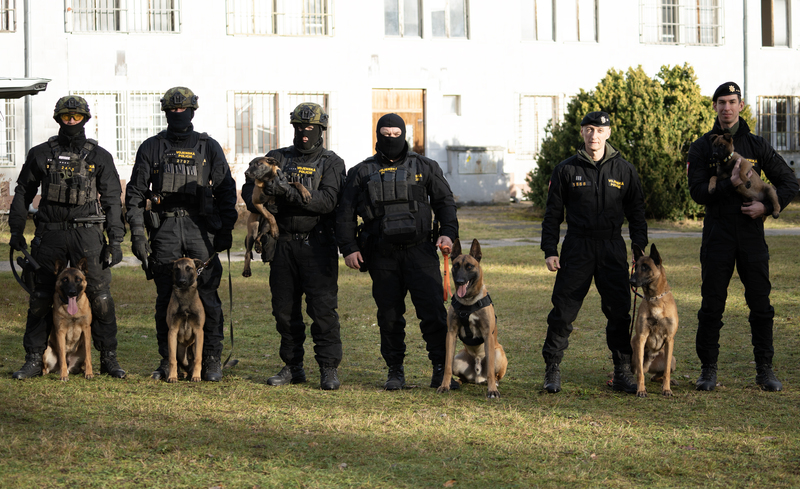
What is your staffing situation? Is there any interest in "service cynology"?
Staffing is stable, there is still a great interest in the job of a dog handler. The problem is rather to choose the right ones among the many applicants. Some have romantic notions inspired by TV series, and then when we introduce them to the reality of what the job entails, many of them quickly lose interest. For those interested from other armed forces, the obligation to complete basic military training in Vyškov, and the associated temporary limitation on the financial income of the individual or the whole family, is usually an obstacle. Those who endure and meet all the demanding requirements are then rewarded with demanding and never-ending work, but in return they get a partner who will never betray them and will always stand by them in all situations.
The handler can take his dog home as a pet after his service career is over. What does this entail?
The dog's active service lasts for many years and a bond is formed between the handler and the dog, which of course does not end when the dog's active service ends. Dogs are a part of handlers' lives and the lives of their families. For this reason, the vast majority of handlers buy and care for their former service dogs. It is the least they can do for them in return for their faithful service. Unfortunately, by being taken out of service, the dog loses its status as a service dog, so all the costs of food and veterinary care go to the handler. Some handlers are not able to keep their former dog for reasons such as lack of space or other compelling reasons. Then there is the possibility of selling this discarded dog to another person. In the event that even this option cannot be implemented at the Military Police unit, the decommissioned dogs are placed at the Military Cynology Centre in Chotynia, where they are cared for with dignity and have all the care they need. From here, too, they can be purchased by other interested parties. The price of such a veteran dog is really symbolic and is in the order of hundreds of crowns.











